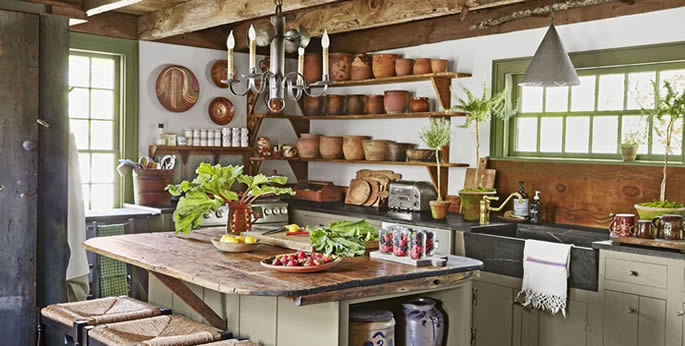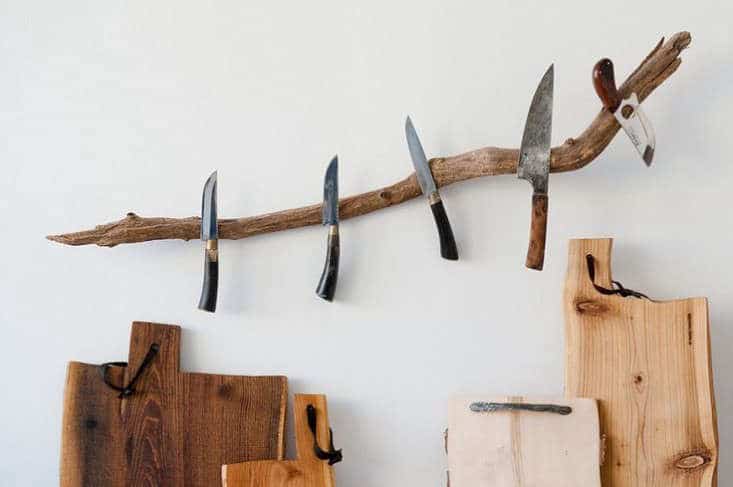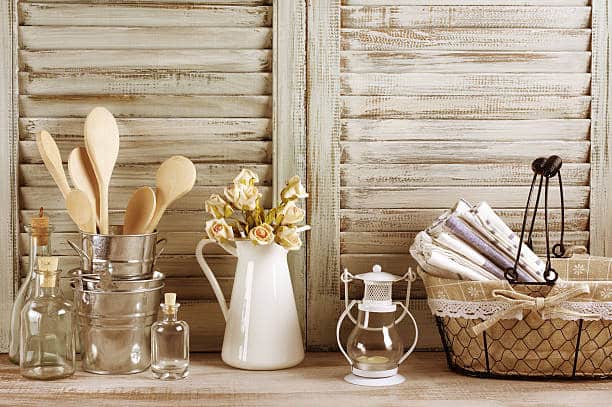The charm of a rustic kitchen lies in its timeless appeal, combining elements of warmth, simplicity, and natural beauty.
Whether you live in a countryside cottage or a modern urban apartment, you can transform your kitchen into a welcoming rustic haven that evokes feelings of comfort and nostalgia.
How To Design Your Own Rustic Kitchen
In this article, we’ll explore the key elements and steps to create your very own rustic kitchen.
Choose Natural Materials
The foundation of any rustic kitchen is the use of natural materials.
Wood, stone, and brick are the primary building blocks that give the space an earthy and authentic feel.

Consider using reclaimed wood for your cabinets, countertops, and flooring to add character and a touch of history to your kitchen.
Stone or brick walls can also be incorporated for a truly rustic ambiance.
Embrace Wood Elements
Wood plays a central role in rustic kitchens.
Opt for exposed wooden beams on your ceiling, wooden cabinetry, and open shelving made from distressed or reclaimed wood.
The imperfections and aged look of the wood will add to the rustic charm.
Warm Color Palette
Choose a warm and earthy color palette for your rustic kitchen.
Earthy tones such as muted greens, browns, deep reds, and warm grays work well to create a cozy and inviting atmosphere.
Natural colors complement the wood and stone elements, providing a harmonious balance.
Vintage and Distressed Finishes
To achieve that time-worn look, consider using vintage or distressed finishes for your kitchen furniture and accessories.

Antique knobs, handles, and fixtures can be incorporated to add a touch of history to the space.
You can also distress your wooden cabinets and furniture to give them an aged appearance.
Open Shelving
Open shelving is a popular choice in rustic kitchens.
It allows you to display your collection of vintage dishes, glassware, and rustic accessories.
Consider using reclaimed wood for your open shelves to maintain the rustic theme.
Farmhouse Sink
A farmhouse sink is a hallmark of rustic kitchens.
Its deep basin and apron front not only provide functionality but also add to the charm of the space.
Choose a sink made from materials like porcelain or fireclay for an authentic touch.
Rustic Lighting
Lighting is a crucial aspect of creating the right ambiance in your rustic kitchen.
Pendant lights with metal or wood finishes can be hung over the kitchen island or dining area.
Consider adding some lantern-style fixtures or wall sconces to enhance the rustic atmosphere.
Vintage Décor and Accessories
Accessorize your rustic kitchen with vintage and farmhouse-inspired décor.

Mason jars, old wooden crates, antique kitchen tools, and vintage signs can be used to add character and personality to the space.
Functional Layout
While aesthetics are important, don’t forget about functionality.
A well-designed kitchen layout that maximizes workspace and storage is essential. Incorporate plenty of cabinets and drawers to keep your kitchen organized and clutter-free.
Personal Touch
Lastly, make your rustic kitchen your own by adding personal touches. Display family heirlooms, artwork, or photos that hold sentimental value.
These personal elements will make your rustic kitchen feel even more inviting and special.
Conclusion
Creating a rustic kitchen is all about blending natural materials, warm colors, vintage elements, and personal touches to achieve a cozy and timeless look.
By embracing the beauty of imperfections and focusing on the charm of the past, you can transform your kitchen into a welcoming space that exudes rustic elegance.
So, roll up your sleeves, gather your inspiration, and embark on the journey of creating your very own rustic kitchen. You may find the information in the article on farmhouse kitchen design helpful as you deign your new kitchen.
https://www.mancaveknowhow.com/rustic-kitchen/
Did you miss our previous article...
https://manstuffnews.com/basement-ideas/how-to-design-your-own-farmhouse-kitchen
 Backyard GrillingWeekend WarriorsAdvice from DadBeard GroomingTV Shows for Guys4x4 Off-Road CarsMens FashionSports NewsAncient Archeology World NewsPrivacy PolicyTerms And Conditions
Backyard GrillingWeekend WarriorsAdvice from DadBeard GroomingTV Shows for Guys4x4 Off-Road CarsMens FashionSports NewsAncient Archeology World NewsPrivacy PolicyTerms And Conditions
